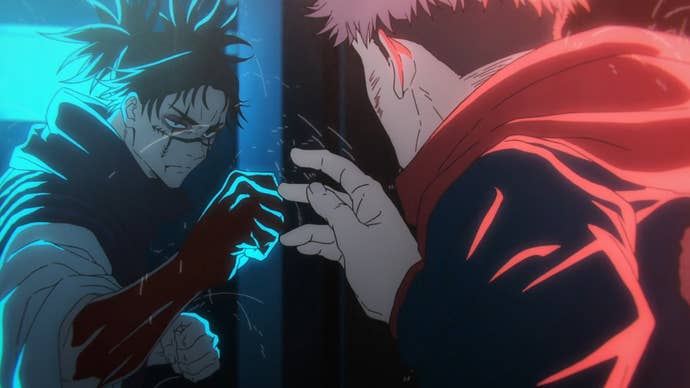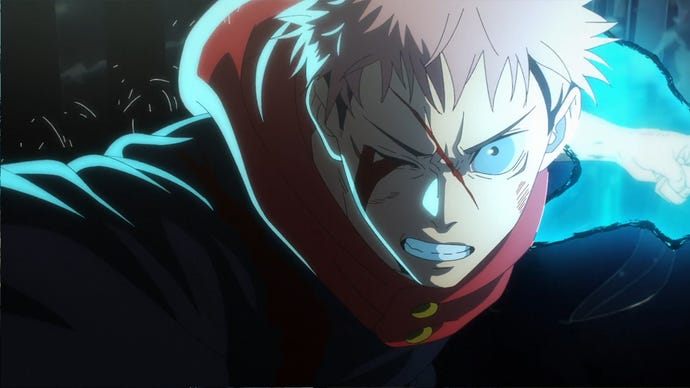Jujutsu Kaisen Season 2, Episode 13: One of the best chapters of anime I’ve ever seen
Shonen has never looked this good.
Have you ever experienced something where you thought, "yeah, this is probably going to be massively influential?" I've been feeling that a lot with the currently airing second season of Jujutsu Kaisen, but the episode that had me feeling that most of all was last week's, i.e. episode 14, Red Scale. It was so good, in fact, I watched it again immediately. I couldn't help myself, the entire time I was watching the episode I kept saying to myself "what the hell?" (except I wasn't saying hell). And I think the reason why it felt like such a special episode comes down to one thing: light.
There's an argument to be made that light is the most important part of filmmaking. It's the thing that provides colour, contrast, brightness or darkness, and it's a part of the storytelling process. You can of course use a whole bunch of colours to tell your story, but this particular episode focused on two to tell its story: red and blue. I won't go into too many story details to avoid spoilers, but the main thing that's happening in this episode is a fight between Jujutsu Kaisen's protagonist, Yuji Itadori, and Choso, a character who holds a deep sense of hatred for Yuji over a personal vendetta.
Like most action shonen, the two of them are incredibly strong, both constantly switching back and forth between having the upperhand and having their ass handed to them. But the most captivating moments of the episode are the slowest ones. Moments where one half of their face is covered in blue light, the other with a dash of red, looking at each other as they try to figure out what the other is doing. That slowness culminates in one particular moment, though, that uses more so the concept of light than light itself in a stunning manner.
Throughout the second season, I've noticed an interesting choice being made for some scenes that don't occur in exactly the same way in a manga. That is, they're presented like home movies, in a 4:3 aspect ratio that will be more familiar to older audiences than what many youngsters will be used to. This particular home movie look, implied to be shot on film, is used in one scene at the climax of the fight that sees Choso experiencing a vision.
It's a surreal moment, not just because of the odd nature of its contents that sees Choso, who we've only known as some villain without much of a backstory, being fed spaghetti by Yuji, the very person he's been trying so hard to kill, but because anime is mostly digital these days. Of course the actual events have meaning (manga readers will know what's up), but from an animation perspective it feels like a conversation with moving image as a whole. As this episode looks back to offer a strange sense of nostalgia, the way the episode is presented, arguably at the very peak of what's possible in animation, looks to the future.

It might be a touch hyperbolic, but with this second season, and in particular this 14th episode, I think Mappa, the studio behind the series, could be as influential as Kyoto Animation. If you don't know KyoAni, it's the studio behind classic sports anime Free!, an anime you can easily feel the influence of in most anime from the 2010s. I genuinely believe Mappa could have such an effect on the next decade of anime, especially when you pair it with another of its series, 2022's Chainsaw Man, itself a tour de force of animation. And yet… there's Mappa itself.
As much as I love Mappa's output, it's also incredibly important to acknowledge that just like many other animation studios in Japan, it sounds like a terrible place to work. There are even allegations of animators being forced to sign NDAs preventing them from talking about what it's like working there, which is as bad a sign as any. It's frustrating because it doesn't need to be like this.
I made the comparison to KyoAni not just because of the impact the studio had, but also because it actually apparently treated its staff well; it was notable as a studio for the simple fact it hired more women animators than anywhere else in industry, even winning a Women in Animation Diversity Award, and even rarer than that it actually had salaried staff, a contrast to other studios which mostly completes work on a contract basis. What I'm saying is, yes I'll probably be thinking about this Jujutsu Kaisen episode for a long time. But if Mappa wants to be the next big studio, it desperately needs to make some changes.
Those that might like their anime to be a bit more interactive might be happy to hear that Jujutsu Kaisen is getting a 3D brawler next year, the perfect gift for the Gojo fanatic in your life.

.jpg?width=70&height=70&fit=crop&quality=60&format=png&auto=webp)
